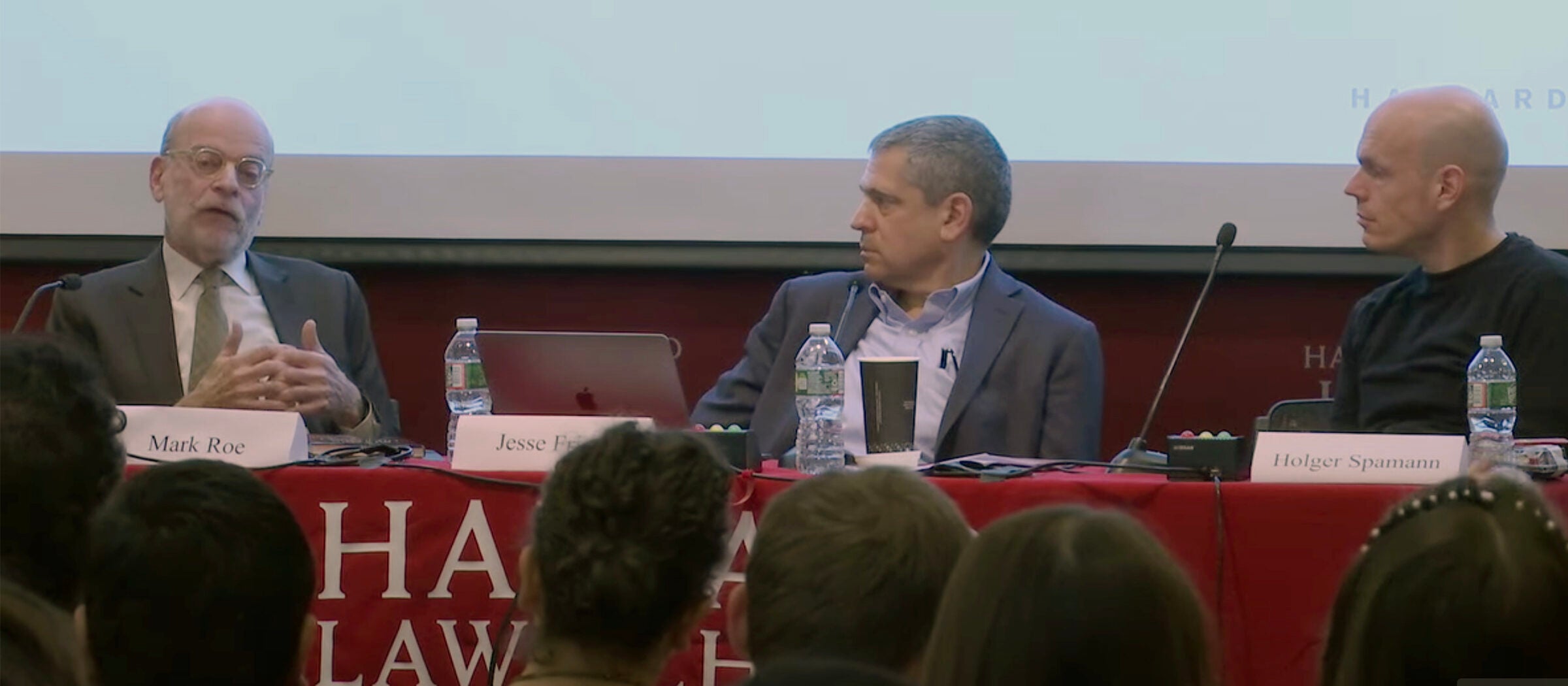According to Professor Mark Roe ’75, not many corporate law issues get widespread media and political attention. One exception, says Roe, the David Berg Professor of Law at Harvard Law School, is stock-market-driven short-termism and the belief that it is doing significant damage to firms and to the economy as well as to stakeholders and the environment.
Roe has analyzed the issue in this recent book, “Missing the Target: Why Stock Market Short-termism Is Not the Problem.” In a panel discussion last month with colleagues sponsored by the Harvard Law School Library, Roe told the audience that the evidence does not support these dire conclusions.
Part of the misunderstanding, said Roe, is that too much public debate defines short-termism too broadly and includes important social problems that are not primarily caused by time horizon problems. “They might derive from the selfishness and incentives of managers and stockholders, but not from their time horizon,” he said.
For example, he said, “Damaging the environment, which is frequently laid at the doorstep of stock market short-termism, should more properly be laid at the doorstep of the stock market and the incentives to do selfish things that externalize costs on to the rest of the economy. But it’s not primarily due to a time horizon problem.”
He contrasted this to what he said would be examples of true stock market short-termism. As his book explores, these include the idea that companies are so focused on keeping stock prices high in the near-term that they are eschewing too many long-run investments in R&D and are shoveling cash into costly stock buybacks even when they have good businesses to invest in. In truth, he says, the data shows that “we probably have a small problem. But in a world and a country where we’ve got lots of big problems, this ought to be far down on the list of things in which we are going to invest a lot of resources to deal with.”

And what are the consequences of conflating social problems with time horizon problems? “They include misunderstanding how the world works,” said Roe. “For people in academia, that’s important. But there are consequences in the real world in decision-making. Short-termism problems seem much bigger than they really are, because we’re including a lot of things that are really important, thinking that they are due to stock-market short-termism.
“There’s a belief among some policymakers that we can solve the problems of climate change or mistreatment of stakeholders by making the firm a longer-run operation,” he added. “That makes policymakers more willing to undertake cures to the time horizon problem in the belief that they are … doing their share to stave off climate catastrophe, environmental disaster, and the like. But it’s unlikely that they’re going to help.”
Jesse Fried ’92, the Dane Professor of Law, who also participated on the panel, discussed one aspect of the book about which he has done some research: share buybacks. “I hope through my presentation,” he told the audience, “that you’ll get a sense of the short-termism hysteria that has gripped parts of our country.”
“It all started with Harvard. And in some sense, it’s Harvard’s fault,” said Fried with a smile. “But it’s the business school not the law school.”
In 2014, he explained, the Harvard Business Review published an article by William Lazonick, who “basically blamed all the social and economic problems in the country on stock buybacks: ‘Stock buybacks are draining companies of cash. They can’t invest. They can’t pay employees.’”
“This article was very well received,” said Fried, “and then this theme went viral. It was picked up by think tanks, asset managers, corporate lawyers, and even some economists.” Lazonick was also successful in convincing politicians this was an issue, said Fried, and there were dozens of bills introduced to regulate stock buybacks.
Fried and Charles Wang, a professor at the Harvard Business School, found that the numbers that Lazonick reported were correct. “If you look at shareholder payouts for any given period — buybacks and dividends— it’s a massive percentage of total net income,” said Fried.
But the figures are misleading, he continued, because of other important factors, including the fact that most stock buybacks are offset by equity issuances where capital flows from shareholders to companies, the opposite direction of share repurchases and dividends. And if you look at investment by companies, he added they are at near record highs, as are cash balances at firms.
“The other thing that people have missed,” said Fried, “is that money that flows out of big publicly traded companies finds its way into the non-listed company sector, which basically drives half of our economy, firms that are backed by VC funds and private equity funds.”
Another panelist, Holger Spamann S.J.D. ’09, Lawrence R. Grove Professor of Law, said it was a special honor to participate as Roe had been his adviser when he was an S.J.D. student. Spamann said he believed that short-termism might be more real than Roe described, but that he, like Roe and Fried, does not see it as a problem — at least not in the way that people usually define what a problem is.
He cited a case of short-termism in accounting and business called “channel stuffing.” At the end of the fiscal year, people try to push through more sales, giving rebates to clients. This is costly in the long run, he said. “Clients who have brought your products this year are not going to buy them next month at the normal price.”
“This is short-termism and it’s a well-known problem,” he said. “It has been empirically documented. And it’s not limited to public companies. It happens in private companies too because they also have investors. … Moreover, the interesting thing about this behavior is that it is a side effect of having an incentive system in the first place.”
Exams in K-12 education are another form of short-termism about which a lot of people worry, Spamann said. Learning for exams can be short-termist, he added. “Rather than cramming, students would be better served if they had a long-term learning plan.”
But schools have exams, he says, because they are a form of accountability, both for students and for teachers, who often end up teaching to the test. “We know that’s a problem, he said. “But at most institutions that is thought to be the lesser of two evils the other evil being not having any accountability.”
These and other forms of short-termism, Spamann says, form a sort of “trade off.”
“That’s why I don’t want to call it a problem,” he said. “It’s a side effect. Always, in medication or in compensation design, you want to, of course, limit the side effects. But as long as you can’t have the good without the negative side effect, you’ll accept the negative side effect. And I don’t think you generally call that a problem, or at least I would not.”
